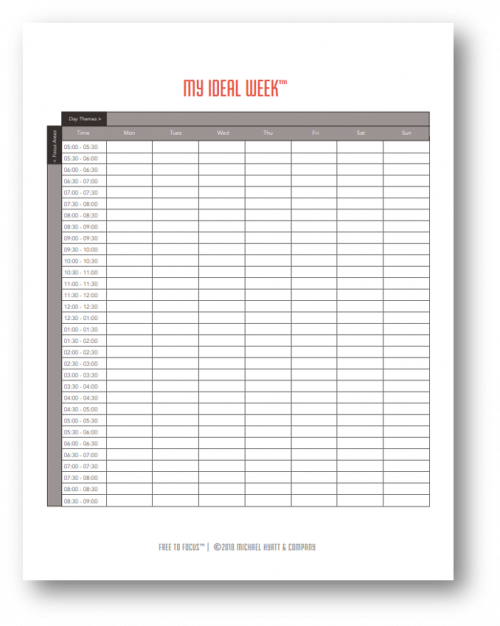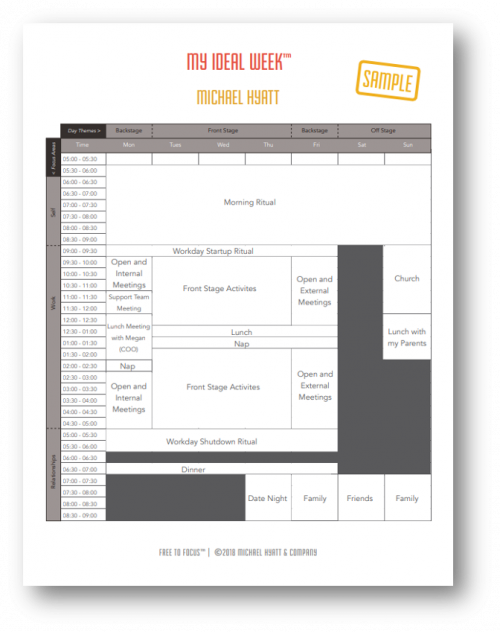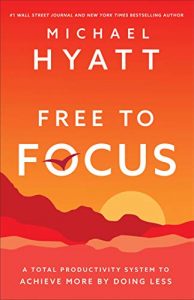Consolidate: Plan Your Ideal Week, page 161.
- The human brain cannot multi-task. Switching from task to task comes at a heavy cost.
- Your attention doesn’t immediately follow one task to the next – a residue of your attention remains stuck thinking about the original task.
- One study found workers average twenty-five minutes to resume a task after an interruption.
- By breaking our focus, switching also slows our processing ability.
- If you multiply the impact of attention residue and irrelevant activity over an entire day of interruptions, the costs add up.
- We stay busy, but we lose ground on the few things that matter most.
- The solution is to design our work to focus on just one thing at a time.
The Power of MegaBatching
- Most of us have heard of batching. It’s the process of lumping similar tasks together and doing them in a dedicated block of time.
- Some examples of MegaBatching:
- Set aside time each morning and afternoon to empty all your inboxes.
- Save a week’s worth of proposals or reports to review all at once.
- Record a whole series of podcasts or training videos over a couple days.
- Batching is one of the best ways I know to stay focused and blast through tasks.
- Megabatching works with meetings too.
- Try to batch as many meetings as possible into the fewest number of days.
- This leaves more days open for intense, focused work without having to stop what you’re doing to run off to someone else’s meeting.
- Cal Newport argues that we need extended periods of uninterrupted time to do our best thinking. This is what he calls Deep Work.
- You can also MegaBatch collaborative time with your teams.
- Team MegaBatching allows teams to stick with challenges long enough to get the breakthroughs they need to deliver results.
Planning Your Ideal Week
- It’s time to harness the power of MegaBatching with a tool called the Ideal Week.
- The Ideal Week allows you to schedule your time the way that you want to spend it.
- “Plans are worthless, but planning is everything.” – Dwight Eisenhower
- A plan might not survive the first engagement with the enemy, but having planned, you’ll be better able to recover and find your footing.
- The premise behind the Ideal Week is that you can either live on purpose (proactive), according to a plan you set. Or you can live by accident (reactive), responding to the demands of others.
- It is a whole lot easier to accomplish what matters most when you are proactive and begin with the end in mind.
- The Ideal Week is like a financial budget. The only difference is that you plan how you will spend your time rather than your money.
How to Build Your Ideal Week
- Start with an empty calendar for each day of the week. A blank slate.
- Next, decide which days of the week will be Front Stage (Customer Facing, aka what you were hired to do), and which days will be Backstage (internal meetings, planning, organizing, email, research, learning and development).
- Next, indicate what types of activities (self, work, rejuvenation, etc.) you’ll do on individual days during certain blocks of time.
- You can’t bring your best to the rest of the day unless you schedule time to refresh.
- The point here is to give shape to your day, with hard starts and stops.
- Once you’ve identified stages and themes, it’s time to group the individual activities that will fall into those themes.
- I have found that the exact time and variance are immaterial if you’re intentional about batching as much as possible.
- Resist the temptation to think you can go without breaks.
- The last thing you do after drafting your Ideal Week is to selectively share it with team members, supportive supervisors, and others you are close to outside of work.
- You’re going to need everyone’s input, buy-in, and cooperation to make it
A More Productive Rhythm
- Keep in mind that your Ideal Week is just that – ideal.
- It won’t happen every week. In fact, it won’t happen most weeks. When emergencies pop up, you’ll need to pivot.
- The Ideal Week keeps you from getting disoriented in the process; you’ll know exactly how to get back on track because you already planned it.
Exercise: Plan Your Ideal Week
- Download your Ideal Week template at FreeToFocus.com/tools.
- Sketch out your Ideal Week before moving on.





